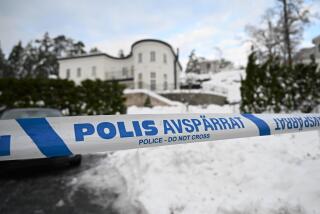Soviets Expel Japanese Aide, Businessman : 2 Accused of Spying; Tokyo Orders Moscow Trade Official Out
- Share via
MOSCOW — The Soviet Union on Thursday ordered a Japanese military attache and a businessman out of the country after accusing them of espionage.
Japan denied the charges and ordered a Soviet trade official to leave but said the expulsion was not in retaliation for the Soviet move.
Gennady I. Gerasimov, chief spokesman for the Soviet Foreign Ministry, said in Moscow that a third Japanese--also a diplomat--was suspected of espionage but was not expelled.
It is the first time since World War II that the Soviet Union has ordered a Japanese diplomat to leave.
Gerasimov told reporters at a briefing that Japanese naval attache Nobuhiro Takeshima and defense attache Tomohiro Okamoto, an air force colonel, “were involved in espionage activities” while in the Soviet port city of Odessa on the Black Sea on July 29 and that Takeshima had been ordered to leave the country.
Details of Charges
Soji Takao Otani, a Moscow representative of the giant Mitsubishi manufacturing company, attempted to obtain commercial secrets from the Soviet Foreign Trade Ministry, engaged in illegal speculation and violated Soviet travel restrictions, Gerasimov said.
A Japanese diplomat, authorized to speak for his embassy but only on condition his name not be used, flatly denied the military attaches were engaged in spying.
“We deny it completely and believe it is totally groundless,” the official said. He said that Okamoto and Takeshima had been in Odessa on an official trip in connection with their duties at the embassy. He also said neither man had left yet.
There was no immediate explanation why only one of the two diplomats was being expelled. Nor was there any indication that Otani was being formally charged with criminal activity, although Gerasimov accused him of violating Soviet laws.
The Soviet spokesman also accused the Japanese government and press of engaging in an “anti-Soviet campaign.”
The Japanese Foreign Ministry said the expulsion of Yuri G. Pokrovsky, a Soviet vice trade representative in Tokyo, was not linked to the expulsion orders issued in Moscow. The ministry said Pokrovsky was ordered out after he refused to answer police questions about alleged Soviet purchases of information stolen from an aircraft instrument maker.
A Japanese Foreign Ministry official, who spoke on condition of anonymity, said Kazutoshi Hasegawa, director general of the ministry’s European Affairs Bureau, summoned Soviet Charge d’Affaires Yuri D. Kuznetsov to the ministry Thursday and told him that despite a Japanese police request on July 20, Pokrovsky had not appeared to answer questions about the alleged purchase of information about aeronautical systems and instruments. The data was allegedly stolen from his company by Minoru Shimizu, director of the Tokyo Aircraft Instrument Co.’s enterprise department.
Tokyo Aircraft Instrument was reported to have been producing instruments and fixtures for military planes, including F-15 jet fighters and P-3C anti-submarine patrol planes, for the Japan Defense Agency.
More to Read
Sign up for Essential California
The most important California stories and recommendations in your inbox every morning.
You may occasionally receive promotional content from the Los Angeles Times.










